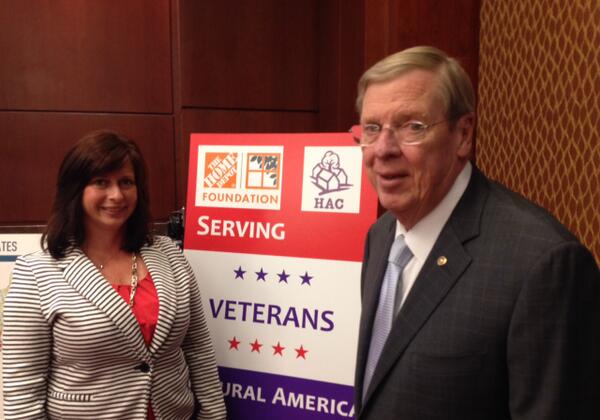News Formats. pdf
February 22, 2019
Vol. 48, No. 4
FY19 appropriations agreement fully funds most housing programs • Consumer Financial Protection Bureau proposes to rescind parts of payday lending rule • USDA and HHS partner to create recovery housing in rural communities • Indian CDBG funding competition reopens • HUD requests comments on streamlined requirements for small rural PHAs • HAC webinar to review Section 502 updates • Confirmation hearing held for FHFA nominee Calabria • Senate Indian Affairs Committee passes bill to provide housing vouchers for Native veterans • Fed chair highlights economic prosperity gap • Study finds nearly 35% of rural counties experienced population loss • Rural housing hearing postponed • HAC offers grants for housing aid to rural veterans • HAC symposium on rural veterans’ housing and services scheduled for April in Arkansas
HAC News Formats. pdf
February 22, 2019
Vol. 48, No. 4
FY19 appropriations agreement fully funds most housing programs.
A final consolidated appropriations act, worked out by congressional negotiators and signed by President Trump on February 15, will fund numerous federal agencies, including USDA and HUD, through the end of fiscal year 2019 on September 30. The compromise keeps many USDA and HUD housing programs at FY18 levels, with a few increases and decreases. Tables showing funding levels are posted on HAC’s site.
USDA rural housing programs receiving added monies include Section 514 and 516 farmworker housing loans and grants, Section 533 Housing Preservation Grants, the Multifamily Preservation and Revitalization (MPR) program, and the Rural Community Development Initiative. The bill’s small increase in Section 542 vouchers and drop in Section 521 Rental Assistance are expected to accommodate changes in the level of usage of those programs. The measure renews technical assistance funding for rural rental preservation, again directs USDA to provide incentives for nonprofit organizations and public housing agencies to acquire and preserve rural rental properties, and continues the intermediary packaging program for Section 502 direct homeownership loans. It directs USDA to provide a report on maturing mortgages for rental properties, including a preservation strategy, within one year. The conference report on the bill expresses concern about the costs of moving the Economic Research Service and National Institute of Food and Agriculture out of Washington, DC, and supports “an indefinite delay” in shifting ERS to the Office of the Chief Economist.
HUD’s final appropriation includes enough funding to renew all existing rental assistance contracts, including contracts for Section 202 and Section 811 tenants. Funding for the HOME program drops by over $100 million. McKinney-Vento homeless assistance programs see an increase, as do Housing Opportunities for Persons with AIDS and healthy homes/lead hazard control. In addition to level-funding Native American Housing Block Grants at $655 million, the bill provides $100 million for grants to be awarded competitively. It also creates a new $28 million Housing Choice Voucher mobility demonstration to help families with children move to lower-poverty areas of opportunity.
Consumer Financial Protection Bureau proposes to rescind parts of payday lending rule.
Comments are due May 15 on a CFPB proposal to rescind parts of a 2017 regulation. CFPB suggests there was insufficient evidence and legal support for its requirement that before making a payday, single-payment vehicle title or longer-term balloon payment loan, a lender determine that a consumer has the ability to repay it. A separate notice proposes to delay the August 19, 2019 compliance date to November 19, 2020; comments on the possible delay are due March 18. For more information, contact Eliott C. Ponte, CFPB, 202-435-7700.
USDA and HHS partner to create recovery housing in rural communities.
USDA Rural Development and the Substance Abuse and Mental Health Services Administration of the Department of Health and Human Services will coordinate efforts to sell USDA’s REO single-family housing properties at a discount to nonprofits that provide housing, treatment, job training and other services for people in substance misuse treatment and recovery.
Indian CDBG funding competition reopens.
Tribal governments and tribal organizations have an additional 30 days, until March 20, to apply for the Community Development Block Grant Program for Indian Tribes and Alaska Native Villages.
HUD requests comments on streamlined requirements for small rural PHAs.
Legislation signed into law in May 2018 streamlines requirements related to program inspections and evaluations, corrective action requirements, environmental reviews, and energy conservation for small PHAs, which it defines as those that administer 550 or fewer combined public housing units and vouchers and predominantly operate in a rural area. HUD now seeks comments on its implementation of these provisions, including how it should interpret “predominantly operates” in a rural area. (The statute and CFPB regulations define “rural area.”) HUD also asks for input on requirements for new information systems for public housing consortia and on shared waiting list software. Comments are due April 15. For more information, contact Harold Katsura, HUD, 202-402-3042.
HAC webinar to review Section 502 updates.
“USDA Section 502 Loan Program Updates: USDA Handbook 1-3550 Updates from 2017-2019” is scheduled for March 27 at 2 pm eastern time. It will cover changes to the Section 502 direct loan program implemented during FY17 and 18, most of which relate to the determination and documentation of applicant assets, income and credit history. For more information, contact HAC staff, 404-892-4824.
Confirmation hearing held for FHFA nominee Calabria.
The Senate Banking Committee held a hearing February 14 on Mark Calabria’s nomination to direct the Federal Housing Finance Agency. Calabria, who has criticized the current housing finance system, said in his written statement that despite his “frustration with the current state of our mortgage system and the need for reform,” he wanted “to very clearly state to this Committee, that if confirmed, my role as Director of FHFA is to carry out the clear intent of Congress, not to impose my own vision.” He mentioned his commitment to rural and tribal affordable housing at several points during the hearing, including in response to a question from Senator Tina Smith (D-MN) about the future of Duty to Serve, which he committed to “keep in place as long as the existing regulatory structure is there.”
Senate Indian Affairs Committee passes bill to provide housing vouchers for Native veterans.
S. 257 would provide rental assistance to homeless or at-risk Native American veterans. It authorizes the existing tribal HUD-VASH program beyond the current pilot program, including provisions to have government agencies work cooperatively and ensure that case management is available and culturally appropriate.
Fed chair highlights economic prosperity gap.
Speaking at a Mississippi event titled “Rural Places, Rural Spaces: Closing Financial Service Gaps in Persistent Poverty America,” Federal Reserve Chair Jerome Powell noted that rural areas have not shared equally in overall economic prosperity. Powell stated that poverty, lack of access to credit and limited access to education resources hamper prosperity in rural areas, particularly in persistent poverty counties. His remarks expand on the message he delivered at HAC’s 2018 Rural Housing Conference in December.
Study finds nearly 35% of rural counties experienced population loss.
“Rural Depopulation in a Rapidly Urbanizing America,” published by the Carsey School of Public Policy, reports that nearly 35% of rural counties suffer from long-term population loss. A combination of young-adult outmigration, fewer births, and more deaths contributes to the decreasing populations. Not all rural areas are losing population: rural counties that are close to metropolitan areas or high-amenity areas are more likely to experience population growth. The brief offers policy changes to address the issue.
Rural housing hearing postponed.
The hearing titled “The Affordable Housing Crisis in Rural America: Assessing the Federal Response,” originally scheduled for February 14, was postponed by the Housing, Community Development, and Insurance Subcommittee of the House Financial Services Committee. A new date has not yet been announced. Drafts of several pieces of rural housing legislation are posted online.
HAC offers grants for housing aid to rural veterans.
HAC’s Affordable Housing for Rural Veterans initiative supports local nonprofit housing development organizations that meet or help meet the affordable housing needs of veterans in rural areas. Grants may be up to $30,000 and must support bricks-and-mortar projects that assist low-income, elderly and/or disabled veterans with home repair and rehab needs, support homeless veterans, help veterans become homeowners and/or secure affordable rental housing. This initiative is funded through the generous support of the Home Depot Foundation. Applications are due March 11. For more information, contact HAC staff, ahrv@ruralhome.org.
HAC symposium on rural veterans’ housing and services scheduled for April in Arkansas.
HAC’s 5th Annual National Symposium on Veterans Housing Issues will be held April 18-19 at Arkansas State University in Jonesboro, sponsored by the Home Depot Foundation. This year’s theme centers on addressing the critical needs around housing, homelessness and aging solutions for rural veterans, within the context of the Delta Regional Authority’s eight-state service area. There is no fee to attend, but space is limited and advance registration is required. For more information, contact Cheryl Cobbler, HAC.
Need capital for your affordable housing project?
HAC’s loan funds provide low interest rate loans to support single- and multifamily affordable housing projects for low-income rural residents throughout the U.S. and territories. Capital is available for all types of affordable and mixed-income housing projects, including preservation, farmworker, senior and veteran housing. HAC loan funds can be used for pre-development, site acquisition, site development and construction/rehabilitation. Contact HAC’s loan fund staff at hacloanfund@ruralhome.org, 202-842-8600.
Please note: HAC is not able to offer loans to individuals or families. Borrowers must be nonprofit or for-profit organizations or government entities (including tribes).



